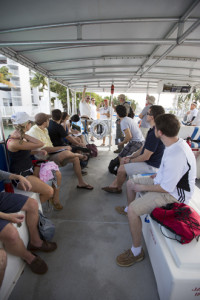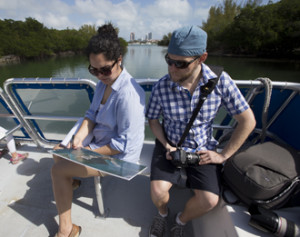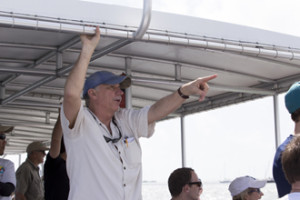
Students listen as Spencer Crowley talks about navigation rights, working waterfront land use issues and coastal restoration around Biscayne Bay and the Miami River. UF/IFAS Photo by Amy Stuart
Elizabeth Turner, a third-year law student studying environmental and land use law at the University of Florida Levin College of Law, could have spent her Spring Break away from her classmates basking in the sun. Instead, she enrolled in a special field course for land-use law students to get some hands-on training for her future career.
During the week-long course, led by Florida Sea Grant legal specialist Tom Ankersen, students explored the diverse marine and coastal ecoregion shared by South Florida and the Bahamian archipelago. The purpose was to provide students a firm grounding in the law, policy and practice of coastal and marine sustainable development through field-based immersion, practitioner lectures and reflective discussions.
“I’m a Miami native, so this course attracted me to learn more about the law and policy surrounding Biscayne Bay,” Turner said. “And for the Bahamas, I think it’s just a really fascinating region where there are a lot of interesting things going on. I think it’s just a great way to spend Spring Break.”
The group traveled from the intensely developed waterfront of Miami’s Biscayne Bay to the bustling government center of Nassau in the Bahamas, and then on to the quiet, rural family island of Andros, bounded by the great Bahama Bank and the Tongue of the Ocean. While there is a world of difference between Florida and the Bahamas, the two neighbors do share a remarkably similar ecosystem facing many of the same threats, as well as a common language of the common law.

Beatriz Hernandez and Thomas Hawkins, an adjunct professor of law at UF, examine a navigational map of Biscayne Bay while listening to a lecture about current development issues around Miami. UF/IFAS Photo by Amy Stuart
The first leg of the journey began on South Beach, and was led by UF law grad Spencer Crowley, a partner in Akerman LLP’s land use practice area. Crowley organized a day-long boat and lecture tour of Biscayne Bay and the Miami River that covered navigation rights, working waterfront land use issue,s and coastal and estuarine restoration. Crowley, who is involved in a wide variety of waterfront land use matters, emphasized the symbiotic relationship between his private practice and civic engagement.
The next stop was Nassau, Bahamas, for a day of faculty-student exchange with the College of the Bahamas and the Eugene Dupuch Law School. The exchange featured work of the Bahamas new environmental law clinic on a proposed coral reef protection act that was informed by UF Law’s Conservation Clinic research on comparative vessel grounding and dredging legislation. The day concluded with a two-hour lecture on Caribbean environmental law led by the Honorable Justice Abdulai Conteh of the Bahamas Court of Appeals.

Tom Ankersen, Florida Sea Grant legal specialist, organized the Spring Break field course that began in Miami and ended in the Bahamas. UF/IFAS Photo by Amy Stuart
The last stop was a short hop in a “puddle jumper” to the rural Bahamian family island of Andros, where students experienced the “real Bahamas.” There students got a glimpse of the challenges of managing natural resources in a nation that is more water than land and more fish than people. Students were also exposed to the uniquely Caribbean form of communal land tenure known as “family” or “generation” lands.
This year’s Spring Break field course furthers the UF Law Conservation Clinic’s South Florida Bahamas ecoregional initiative supported by Florida Sea Grant, in partnership with the Bahamas National Trust.
Editor’s note: Portions of this article were originally published by FlaLaw Online, and is adapted and republished here as part of Florida Sea Grant’s collaboration with the University of Florida Conservation Clinic.



